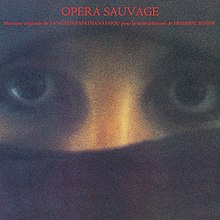Opéra Sauvage is a soundtrack album by the Greek electronic composer Vangelis, released in 1979. It is the score for the nature documentary of the same title by French filmmaker Frédéric Rossif. It is considered one of Vangelis' best albums and is his second most successful album in the USA, reaching #42 in the album charts.[1]
| Opéra Sauvage | ||||
|---|---|---|---|---|
 | ||||
| Soundtrack album by | ||||
| Released | 1979 | |||
| Recorded | 1978–79 | |||
| Studio | Nemo Studios, London[1] | |||
| Genre | Electronic[2] | |||
| Length | 43:06 | |||
| Label | Polydor | |||
| Producer | Vangelis | |||
| Vangelis chronology | ||||
| ||||
| Singles from Opéra Sauvage | ||||
| ||||
Overview
editVangelis produced this album during his electro-acoustic period, which was one of the most productive in his musical career. Opéra Sauvage is more akin to his classic sound than his earlier nature scores for the same director, Frédéric Rossif, such as L'Apocalypse des animaux and La Fête sauvage. A later collaboration with Rossif in the style of Opéra sauvage was Sauvage et Beau.[3]
"Hymne" was re-recorded in choral version for the 1991 Eureka concert by Vangelis in Rotterdam.[4]
Release
editThe album reached #42 in the Billboard 200, and stayed in the charts for 39 weeks.[5]
Instrumentation
editVangelis plays several synthesizers, piano, Fender Rhodes electric piano (featured extensively on "Rêve"),[6] drums, percussion, xylophone, as well as acoustic and bass guitar ("Chromatique"). Jon Anderson is credited with playing harp on "Flamants Roses".[1]
Composition
editThe album is full of classical-based and warm melodies, orchestrated with Yamaha CS-80 sounds.[6] "Hymne", "L'Enfant", "Mouettes" and "Irlande" build on fairly simple themes that are developed instrumentally. "Rêve" is, indeed, as the title suggests, a dreamy calm piece with the hint of jazz in the climax. "Chromatique" has a chromatic instrumental line with chords on an acoustic guitar. "Flamants Roses", finally, consists of several parts, from slow to upbeat, and finishing off with a bluesy finale; Jon Anderson features prominently on harp.[1]
Reception
edit| Review scores | |
|---|---|
| Source | Rating |
| Allmusic | [2] |
In the Allmusic review it is described as "rich, electronic orchestrations range from grandly symphonic to simple and serene" and as an "excellent introduction to his music".[2]
Track listing
edit| No. | Title | Length |
|---|---|---|
| 1. | "Hymne" | 2:40 |
| 2. | "Rêve" | 12:26 |
| 3. | "L'Enfant" | 4:57 |
| 4. | "Mouettes" | 2:28 |
| 5. | "Chromatique" | 3:25 |
| 6. | "Irlande" | 4:43 |
| 7. | "Flamants Roses" | 11:50 |
Personnel
edit- Vangelis – synthesisers and all instruments
- Jon Anderson – harp on "Flamants Roses"
- Production
- Vangelis – producer, arranger, artwork and cover design
- Keith Spencer-Allen, Raphael Preston, Marlis Duncklau – engineers
- Raphael Preston, Marlis Duncklau – assistant engineers
- Hitoshi Takiguchi – mastering engineer
- Veronique Skawinska – photography
- Tokiwa Kinoshita – art coordinator
- Minoru Harada – product manager
Other appearances
edit- A documentary on the Chariots of Fire (1981) special-edition DVD video relates that director Hugh Hudson intended to use the 7/4 piece "L'Enfant", which he was particularly fond of, as the opening titles over the first scene on the beach, until Vangelis talked him into letting him compose the iconic Chariots of Fire theme.[1] The director then had "L'Enfant" being played in the film by a brass band as source music. A re-recorded version of "Hymne" was used as the score cue for Eric Liddell's first race in the Scottish Highlands.[1]
- "L'Enfant" was included in the soundtrack of the film The Year of Living Dangerously (1982) by Peter Weir.[7]
- It was also used as the theme for the 1980 Winter Olympics in USA.[4]
- "Hymne" was the tune of Barilla pasta television advertisements aired in Italy throughout the 1980s.[8] In the US, it was the tune for Ernest & Julio Gallo wine advertisements.[citation needed]
- "L'enfant" was the main title music of the Hungarian TV program "A Hét" (The Week) in the late 1980s and the early 1990s.[citation needed]
- A sample of "Rêve" was used in the 2002 single "Solarcoaster" by Solarstone.
Charts
edit
Weekly chartsedit
|
Year-end chartsedit
|
References
edit- ^ a b c d e f "Rediscovered Gem – Opéra Sauvage". uDiscover. 27 August 2014. Retrieved 22 August 2016.
- ^ a b c Allmusic review.
- ^ Griffin 1997, p. 19.
- ^ a b Griffin 1997, p. 43.
- ^ "Vangelis Chart History – Billboard 200 chart". Billboard. Retrieved 19 August 2016.
- ^ a b "Vangelis – Opera Sauvage". Synthtopia. 22 November 2003. Retrieved 22 August 2016.
- ^ Griffin 1997, p. 43, 66.
- ^ "Archivio Storico Barilla – Spot "Gattino" 1986". Retrieved 14 November 2018.
- ^ "Vangelis Chart History (Billboard 200)". Billboard. Retrieved 6 March 2021.
- ^ "Top Billboard 200 Albums – Year-End 1987". Billboard. Retrieved 6 March 2021.
- Mark J. T. Griffin (1997). Vangelis: The Unknown Man : an Unauthorised Biography. Lulu. ISBN 9780952318729.
External links
edit- Opera Sauvage at Vangelis Movements